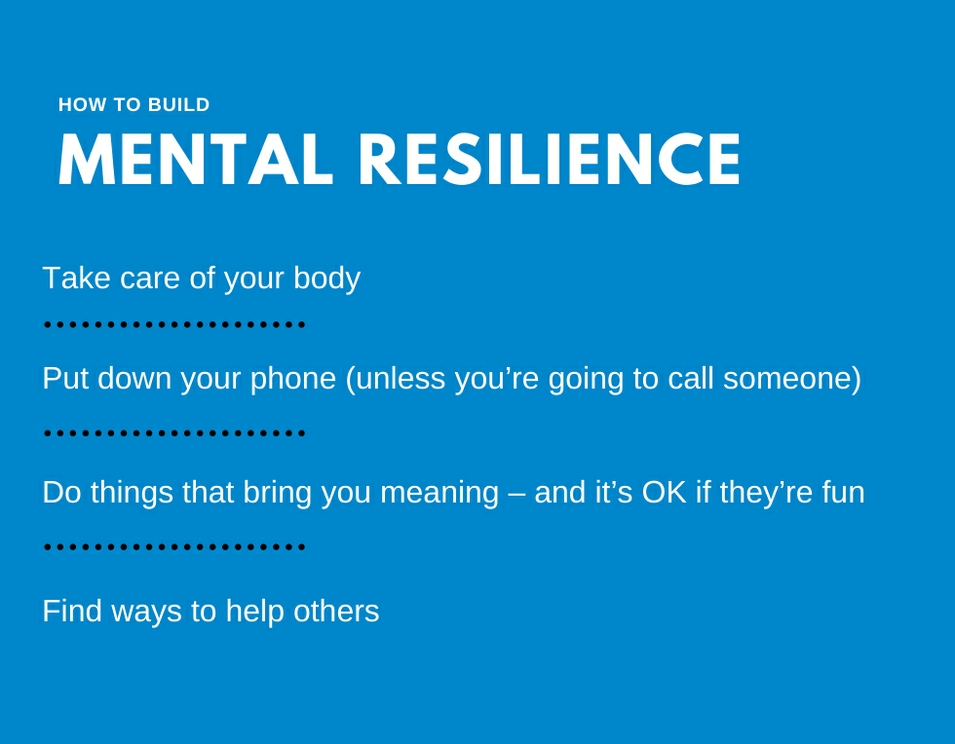Strengthening Mental Resilience: Practical Steps For A Healthier You

Table of Contents
Understanding Mental Resilience
Defining Mental Resilience
Mental resilience is the ability to bounce back from adversity, adapt to change, and maintain a positive outlook despite life's inevitable challenges. It's a crucial aspect of psychological well-being, encompassing effective stress management and emotional regulation. Developing strong coping mechanisms is central to building mental resilience. It's not about avoiding challenges altogether; instead, it's about developing the skills to effectively navigate and overcome them.
- Definition: The capacity to recover quickly from difficulties; toughness.
- Benefits: Improved coping skills, reduced stress levels, increased self-esteem, enhanced productivity, better relationships, and improved physical health.
- Misconceptions: Mental resilience isn't about being fearless or never experiencing setbacks. It's about your ability to adapt, learn, and grow from challenging experiences.
Practical Strategies for Building Mental Resilience
Cultivating a Positive Mindset
A positive mindset is a cornerstone of strengthening mental resilience. Positive self-talk, mindfulness practices, and reframing negative thoughts are powerful tools. Optimism and cognitive restructuring play vital roles in developing this crucial aspect of mental well-being.
- Practice gratitude journaling: Regularly writing down things you're grateful for can shift your focus towards the positive aspects of your life.
- Challenge negative thoughts: When faced with negative thoughts, actively question their validity and replace them with more balanced and realistic perspectives.
- Engage in positive affirmations: Repeating positive statements about yourself can help boost your self-esteem and confidence.
- Surround yourself with positive influences: Spend time with supportive and uplifting people who encourage your growth and well-being.
Developing Healthy Habits
A healthy lifestyle significantly impacts your mental resilience. Prioritizing sleep, nutrition, and regular exercise contributes to both physical and mental well-being. Stress reduction techniques are also essential.
- Aim for 7-8 hours of quality sleep per night: Adequate sleep is crucial for cognitive function, emotional regulation, and overall well-being.
- Eat a balanced diet rich in fruits, vegetables, and whole grains: Nourishing your body with healthy foods provides the fuel your brain needs to function optimally.
- Engage in regular physical activity (at least 30 minutes most days): Exercise releases endorphins, which have mood-boosting effects.
- Practice relaxation techniques like yoga or meditation: These practices can help calm your mind, reduce stress, and improve your ability to manage challenging situations.
Building Strong Social Connections
Strong social connections are a vital buffer against stress and adversity. Feeling a sense of belonging and connection significantly improves mental resilience.
- Nurture close relationships with family and friends: These relationships provide emotional support and a sense of security.
- Join social groups or clubs based on your interests: Connecting with like-minded individuals can expand your social circle and provide opportunities for socialization.
- Volunteer your time to help others: Helping others can boost your self-esteem and provide a sense of purpose.
- Seek professional help when needed: Don't hesitate to reach out to a therapist or counselor if you're struggling to cope with stress or other mental health challenges.
Mastering Stress Management Techniques
Effective stress management is key to strengthening mental resilience. Various techniques can help you manage stress levels and prevent burnout.
- Learn and practice deep breathing exercises: Deep breathing can calm your nervous system and reduce feelings of anxiety.
- Incorporate mindfulness meditation into your daily routine: Mindfulness helps you focus on the present moment and reduce overthinking.
- Prioritize tasks and manage your time effectively: Effective time management can reduce stress and increase feelings of control.
- Use relaxation apps or guided meditations: Many apps offer guided meditations and relaxation exercises to help you manage stress.
Seeking Professional Support for Mental Resilience
While the strategies above can significantly improve your mental resilience, seeking professional support is crucial if you're struggling with persistent stress, anxiety, or other mental health challenges.
- Recognize the signs of burnout or overwhelming stress: Persistent fatigue, irritability, difficulty concentrating, and changes in sleep patterns can indicate burnout.
- Understand the benefits of seeking professional guidance: A therapist or counselor can provide personalized support and coping strategies.
- Research and find qualified mental health professionals: Look for licensed professionals with experience in areas relevant to your needs.
- Utilize available resources and support networks: Many resources are available to help you access mental health services.
Conclusion
Strengthening mental resilience is an ongoing process that involves cultivating a positive mindset, developing healthy habits, building strong social connections, mastering stress management techniques, and seeking professional support when needed. By incorporating these strategies into your life, you can significantly improve your ability to cope with challenges and live a healthier, more fulfilling life. Start strengthening your mental resilience today! Choose one of the practical steps outlined above and begin incorporating it into your daily routine. By proactively investing in your mental well-being, you'll be better equipped to handle life's inevitable challenges and live a healthier, more fulfilling life.

Featured Posts
-
 Formula 1 Soku Ferrari Sueruecueleri Diskalifiye Edildi
May 20, 2025
Formula 1 Soku Ferrari Sueruecueleri Diskalifiye Edildi
May 20, 2025 -
 Tadic O Daytonskom Sporazumu Nesvjesnost Sarajeva I Potencijalni Gubici
May 20, 2025
Tadic O Daytonskom Sporazumu Nesvjesnost Sarajeva I Potencijalni Gubici
May 20, 2025 -
 Robert Pattinson And Suki Waterhouse A Look At Twilight Star Relationships
May 20, 2025
Robert Pattinson And Suki Waterhouse A Look At Twilight Star Relationships
May 20, 2025 -
 Eksereynontas Ta Tampoy Erotas Apodrasi Kai Oi Synepeies
May 20, 2025
Eksereynontas Ta Tampoy Erotas Apodrasi Kai Oi Synepeies
May 20, 2025 -
 March 15 Nyt Mini Crossword Solutions
May 20, 2025
March 15 Nyt Mini Crossword Solutions
May 20, 2025
